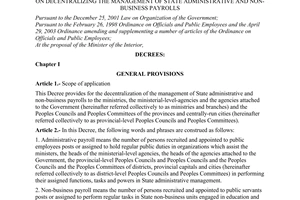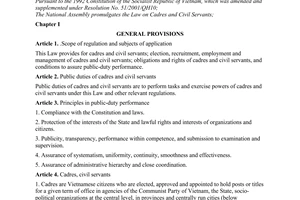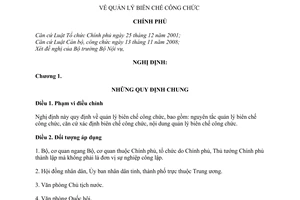Nội dung toàn văn Decree No. 21/2010/ND-CP, on the management of civil servant payrolls
|
THE
GOVERNMENT |
SOCIALIST
REPUBLIC OF VIET NAM |
|
No. 21/2010/ND-CP |
Hanoi, March 08, 2010 |
DECREE
ON THE MANAGEMENT OF CIVIL SERVANT PAYROLLS
THE GOVERNMENT
Pursuant to the December 25,
2001 Law on Organization of the Government;
Pursuant to the November 13, 2008 Law on Cadres and Civil Servants;
At the proposal of the Minister of Home Affairs,
DECREES:
Chapter I
GENERAL PROVISIONS
Article 1. Scope of regulation
This Decree stipulates the management of civil servant payrolls, including principles on the management of civil servant payrolls, bases for identifying civil servant payrolls and contents of management of civil servant payrolls.
Article 2. Subjects of application
1. Ministries, ministerial-level agencies, government-attached agencies, and organizations established by the Government or the Prime Minister which are other than public non-business units.
2. People's Councils and People's Committees of provinces and centrally run cities.
3. The President Office.
4. The National Assembly Office.
5. The State Audit Office.
6. People's courts.
7. People's procuracies.
8. Communist Party of Vietnam bodies at central, provincial and district levels.
9. Socio-political organizations' agencies at central, provincial and district levels.
10. Public non-business units at central, provincial and district levels, including:
a/ Public non-business units of the State;
b/ Public non-business units of the Communist Party of Vietnam;
c/ Public non-business units of socio-political organizations.
Article 3. Principles on the management of civil servant payrolls
1. Compliance with the law on cadres and civil servants and regulations of Communist Party of Vietnam competent bodies.
2. Assurance of uniformity and synchrony between management of civil servant payrolls and recruitment, employment and management of civil servants.
3. Combination between management of civil servant payrolls and civil servant title and working position standards.
4. Satisfaction of administrative reform requirements ensuring that civil servant payrolls suit the functions and tasks of agencies, organizations and units.
5. Publicity, transparency and democracy in the management of civil servant payrolls.
Article 4. Bases for identifying civil servant payrolls
1. For central agencies and organizations
a/ Working positions suitable to the functions, tasks, powers and organizational structure of each agency, organization or unit decided by competent authorities;
b/ Nature, characteristics, level of complexity and scale, scope and subjects of management of sectors or domains;
c/ Professional management processes prescribed by relevant specialized laws;
d/ Level of modernization of working offices, facilities and equipment and application of information technologies:
e/ Practical management of assigned civil servant payrolls of agencies, organizations or units.
2. For local agencies and organizations
a/ Bases specified in Clause 1 of this Article;
b/ Size of population, natural area and level of socio-economic development of localities;
c/ Number of district-level and commune-level administrative units;
d/ Characteristics of political security and social order and safety.
3. For public non-business units
a/ Bases specified in Clause I of this Article:
b/ The Government’s regulations on civil servants in the leadership and managerial apparatuses of public non-business units.
Article 5. Contents of management of civil servant payrolls
1. Formulating and promulgating legal documents on civil servant payrolls, guiding the identification and management of civil servant payrolls.
2. Making annual civil servant payrolls plans, adjusting civil servant payrolls.
3. Deciding on civil servant payrolls; assigning and using civil servant payrolls.
4. Guiding, inspecting and examining the management of civil servant payrolls.
5. Making statistics on. summarizing and reporting on civil servant payrolls.
Chapter II
ANNUAL PLANS ON AND ADJUSTMENT OF CIVIL SERVANT PAYROLLS
SECTION I. ANNUAL PLANS ON CIVIL SERVANT PAYROLLS
Article 6. Making of annual civil servant payroll plans
Agencies, organizations and units mentioned in Clause 2 of this Decree shall make annual civil servant payroll plans under this Decree and the guidance of the Ministry of Home Affairs.
Article 7. Bases for making annual civil servant payroll plans
1. Bases for identifying civil servant payrolls specified in Article 4 of this Decree.
2. Documents of competent agencies guiding the identification of civil servant payrolls.
Article 8. Contents of an annual civil servant payroll plan
1. Report on results of the use of the assigned civil servant payroll of the preceding year, enclosed with statistical forms and summarized data available on the civil servant payroll under the guidance of the Ministry of Home Affairs.
2. Identification of the civil servant payroll.
3. Solutions to implementing the civil servant payroll plan after assignment or approval by competent authorities, projected sources of additional and substitute civil servants, implementation of the payroll streamlining policy and its estimated fund.
Article 9. Time limits for sending annual plans on civil servant payrolls
1. Not later than July 20 of the preceding year, agencies, organizations and units mentioned in Clauses 1 and 2 and at Point a. Clause 10, Article 2 of this Decree shall send their annual civil servant payroll plans to the Ministry of Home Affairs for appraisal and submission to the Prime Minister; agencies, organizations and units mentioned in Clauses 3. 4, 5. 6. 7. 8 and 9. and at Points b and c. Clause 10. Article 2 of this Decree shall send their annual civil servant payroll plans to competent agencies for decision and sending to the Ministry of Home Affairs for general summarization of civil servant payrolls.
2. After July 20 of the preceding year, any agencies, organizations or units that fail to send their annual civil servant payroll plans under Clause 1 Of this Article shall keep unchanged their assigned civil servant payrolls.
Article 10. Dossiers of annual civil servant payroll plans
1. A dossier of the annual civil servant payroll plan comprises:
a/ Written request for approval of the annual civil servant payroll plan:
b/ The annual civil servant payroll plan:
c/ Documents related to the making of the civil servant payroll plan.
2. The written request for approval of an annual civil servant payroll plan shall be signed by the head of the agency, organization or unit, and must contain the following principal details:
a/ The necessity and grounds for making the annual civil servant payroll plan:
b/ Major contents of the annual civil servant payroll plan:
c/ Recommendations, proposals.
SECTION 2. ANNUAL ADJUSTMENT OF CIVIL SERVANT PAYROLLS
Article 11. Bases for adjusting civil servant payrolls
1. Establishment, reorganization or dissolution of agencies, organizations or units under decisions of competent agencies.
2. Establishment, consolidation, division or adjustment of administrative boundaries of provincial-level and district-level administrative units.
3. Adjustment of functions, tasks and powers of agencies, organizations or units under decisions of competent agencies.
Article 12. Dossiers of adjustment of civil servant payrolls
1. Agencies, organizations and units specified in Clauses 1 and 2 and at Point a. Clause 10. Article 2 of this Decree shall make dossiers of adjustment of civil servant payrolls and send them to the Ministry of Home Affairs for settlement according to its competence; agencies, organizations and units specified in Clauses 3. 4, 5, 6. 7, 8 and 9 and at Points b and c. Clause 10, Article 2 of this Decree shall make dossiers of adjustment of civil servant payrolls and send them competent agencies for consideration and decision.
2. A dossier of adjustment of a civil servant payroll comprises:
a/ A written request for adjustment of a civil servant payroll;
b/ The scheme on the adjustment of the civil servant payroll;
c/ Documents related to the adjustment of the civil servant payroll:.
3. A written request for
adjustment of a civil
servant payroll shall be signed by the head of
the agency, organization or unit and must contain
the following principal details:
a/ The necessity and grounds for making the annual civil servant payroll plan:
b/ Major contents of the annual civil servant payroll plan;
c/ Recommendations, proposals.
Chapter III
RESPONSIBILITIES FOR MANAGEMENT OF CIVIL SERVANT PAYROLLS
Article 13. Responsibilities of ministers, heads of rninisterial-level agencies, government-attached agencies and organizations established by the Government or the Prime Minister which are other than public non-business units
1. To direct agencies, organizations and units under their respective management to make annual civil servant payroll plans.
2. Based on the assigned payrolls:
a/ To assign civil servant payrolls to administrative agencies and organizations under their respective management;
b/ To assign civil servant payrolls within the leadership and managerial apparatuses of their attached public non-business units.
3. To implement the regime of statistics and reporting on the management of civil servant payrolls under this Decree and the guidance of the Ministry of Home Affairs.
4. To inspect and examine the observance of the regulations on management of civil servant payrolls by their attached agencies, units and public non-business units.
5. To settle complaints and denunciations on the management of civil servant payrolls under their respective competence.
Article 14. Responsibilities of the Minister of Home Affairs
1. To submit to the Prime Minister for approval the total civil servant payrolls, reserve civil servant payrolls and overseas-working civil servant payrolls of ministries, ministerial-level agencies, government-attached agencies, organizations established by the Government or the Prime Minister which are other than public non-business units, and of provinces and centrally run cities.
2. To assign civil servant payrolls after they are approved by the Prime Minister to each ministry, ministerial-level agency, government-attached agency and organization established by the Government or the Prime Minister which is other than a public non-business unit, and of each province or centrally run city.
3. To assign overseas-working civil servant payrolls after they are approved by the Prime Minister to ministries, ministerial-level agencies and government-attached agencies.
4. To adjust civil servant payrolls within the reserve civil servant payrolls approved by the Prime Minister under this Decree.
5. To issue documents guiding the identification of civil servant payrolls of sectors and domains at the proposal of ministers and heads of ministerial-level agencies, government-attached agencies and organizations established by the Government or the Prime Minister which are other than public non-business units.
6. To summarize and make statistics on civil servant payrolls nationwide and report them to the Government, the Prime Minister and competent agencies.
7. To inspect and examine the management of assigned civil servant payrolls by ministries, ministerial-level agencies, government-attached agencies and organizations established by the Government or the Prime Minister which are other than public non-business units, and People's Committees of provinces and centrally run cities under this Decree and other relevant laws.
8. To settle complaints and denunciations on the management of civil servant payrolls under his/her competence.
Article 15. Responsibilities of the Minister of Finance
1. To formulate tentative levels of expenses for administrative management based on civil servant payrolls of agencies and organizations specified in Clauses 1. 3. 4. 5. 6. 7. 8 and 9, Article 2 of this Decree; to guide provincial-level People's Committees in formulating tentative levels of expenses for administrative management based on civil servant payrolls of agencies and organizations within the People's Councils and People's Committees at all levels.
2. To allocate state budget funds to assure civil servant payrolls of ministries, ministerial-level agencies, government-attached agencies and organizations established by the Government of the Prime Minister which are other than public non-business units; and agencies with their payrolls decided by the Communist Party of Vietnam, the National Assembly Standing Committee and the President.
Article 16. Responsibilities of provincial-level People's Councils
Provincial-level People's Councils shall decide to assign civil servant payrolls of the agencies of the People's Councils. People's Committees and public non-business units of provincial-level and district-level People's
Committees within the civil servant payrolls assigned by competent authorities.
Article 17. Responsibilities of chairpersons of provincial-level People's Committees
1. To direct their attached agencies, organizations and non-business units and district-level People's Committees in making annual civil servant payroll plans.
2. To submit civil servant payrolls to provincial-level People's Councils and implement them after they are decided by the People's Councils.
3. To make statistics and report on the management of civil servant payrolls under this Decree and the guidance of the Ministry of Home Affairs.
4. To examine the observance of the regulations on management of civil servant payrolls by their attached agencies, units and public non-business units.
5. To settle complaints and denunciations on the management of civil servant payrolls under their respective competence.
Chapter IV
IMPLEMENTATION PROVISIONS
Article 18. Effect
This Decree takes effect on May 1, 2010.
To annul the provisions on civil servant payrolls in the Government's Decree No. 71/ 2003/ND-CP of June 19, 2003. on the decentralization of the management of payrolls of state administrative and non-business agencies and units.
Article 19. Implementation responsibility
Ministers, heads of ministerial-level agencies, heads of government-attached agencies, heads of organizations established by the Government or the Prime Minister which are other than public non-business units, presidents of People's Councils and chairpersons of the People's Committees of provinces and centrally run cities, and concerned agencies, organizations and individuals shall implement this Decree.-
|
|
ON
BEHALF OF THE GOVERNMENT |



